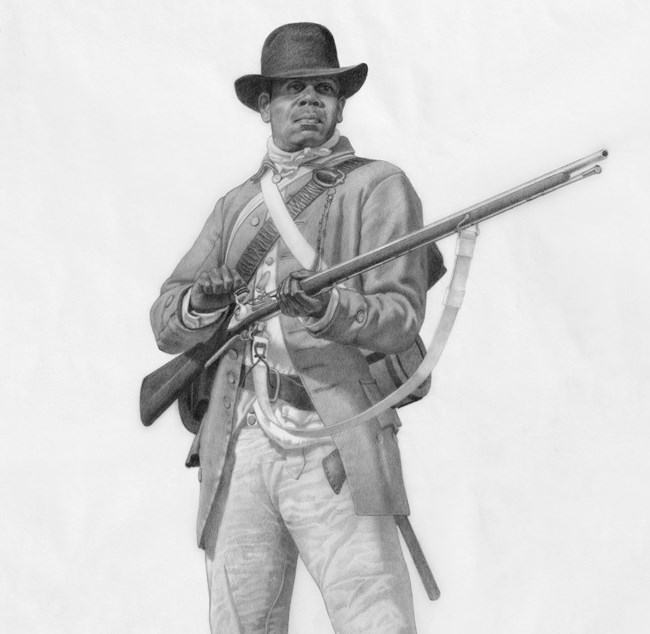
John Rush/NPS Photo
Patriots of Color on April 19, 1775
During the 17th and 18th centuries slavery and racism were an integral part of Colonial American society, and deeply rooted in Massachusetts. Why then would these men fight for a society that treated them as inferior?
In 1775, a wide spectrum of people engaged in warfare to defend what was most dear to them. Some individuals saw the war as an opportunity to affirm their cultural agency or gain further influence with Anglo-American society. Others considered life, liberty, and property to be the birthright of all British subjects and many were willing to die for those concepts. During this tumultuous period filled with talk of liberty and freedom, many individuals also questioned the practice of human enslavement as highly inconsistent with those ideals. African American Militiaman Lemuel Haynes wrote in 1776,
Through the diligent work of the community of color, slavery gradually came to an end in Massachusetts after the American Revolution. In many cases, the veterans of color who fought during the war lead the movements for abolition afterward. Unfortunately, the revolution did not provide freedom for all, instead, it was just the beginning of a long struggle. Under the new United States of America, the practice of slavery grew and solidified in the American South. Eighty-six years after the fighting on April 19, 1775, Americans went to war again; This time to address the problem of slavery, left unresolved from the time of the revolution. Why don't we hear more about this part of the American Revolution? Unfortunately, systemic racism and historical bias have erased or buried many records of Black and Indigenous people who played a prominent role in the founding of the United States. Throughout the following pages you will find the incredible stories of the individuals who risked everything during their struggle for liberty, equality, and freedom for all. Further Research:Gilbert, Alan. Black Patriots and Loyalists Fighting for Emancipation in the War for Independence. Chicago: University of Chicago Press, 2012. Hardesty, Jared Ross Unfreedom: Slavery And Dependence In Eighteenth-Century Boston. New York: New York University Press, 2016. Horton, James Oliver and Lois E. In Hope of Liberty: Culture, Community and Protest among Northern Free Blacks, 1700-1860. New York: Oxford University Press, 1996. Horton, James Oliver and Lois E. Slavery and the Making of America. Chapel Hill: North Carolina University Press, 2009. Horton, James Oliver and Lois E. (Ed.). Slavery and Public History. The Tough Stuff of American Memory. Chapel Hill: North Carolina University Press, 2006. Jasanoff, Maya. Liberty's Exiles: American Loyalists in the Revolutionary World. New York:Alfred A.Knopf, 2011. Lemire, Elise. Black Walden: Slavery and its Aftermath in Concord, Massachusetts. Philadelphia: University of Pennsylvania Press, 2011. Melish, Joanne Pope. Disowning Slavery: Gradual Emancipation and "Race" in New England, 1780-1860. New York: Cornell University Press, 2000. Nash, Gary. The Unknown American Revolution. New York: Penguin Books, 2005. Petrulionis, Sandra Harbert. To Set This World Right: The Antislavery Movement in Thoreau's Concord. New York: Cornell University Press, 2006. Rees, John U. 'They Were Good Soldiers:' African-Americans Serving in the Continental Army, 1775-1783. Solihull, England: Helion & Company, 2019. Simon Schama. Rough Crossings: The Slaves, the British, and the American Revolution. New York: HarperCollins, 2005. Quintal, Jr. George. Patriots of Color. African and Native Americans at Battle Road and Bunker Hill. 2005. |
Last updated: February 24, 2024
